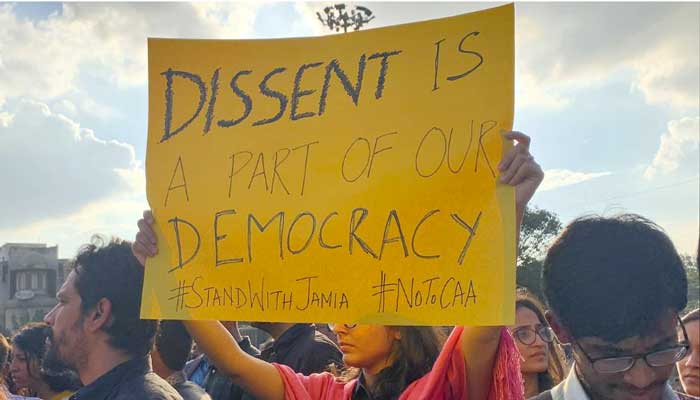India's youth are its most formidable strength against the evil of Hindutva
January 24, 2020

No matter which side of the sub-continental frontier you're living on, everyone is admiring the immense integrity and courage that the Indian youth has shown in standing up against the subversion of their constitutional values of secularism and equal citizenship.
Across India, people of all religions, with their resolve and faith in the Indian constitution, have poured into the streets, challenging the absolute authority of Indian Prime Minister Narendra Modi.
With an elected government bent on attacking diversity, the very foundation on which their country was built, young Indians have bristled with ambition and frustration against the polarization of their country.
Footage of demonstrations against a new law that cites religion as a criterion for citizenship are regularly featured on the news.
In one of those videos, seen on social media, two girls in their 20s stand up to policemen chasing down protesting students and beating them up. Ayesha Renna and Ladeeda Farzana have now become the face of the students protesting against the Modi government.
"I am not scared because I am fighting for what is right [...] We kept quiet when the special status was abrogated in Kashmir. We kept quiet when the Ayodhya temple verdict was issued. This is about us all. This is about our country," Farzana said in a recent interview.
The hotbeds of resistance
The statement shows how highly informed young Indians are about political, civic, and social matters, and how deeply engaged they are in building and sustaining a society based on justice, equality, liberty and secularism, the very idea of their constitution.
But this collective determination hasn’t been built overnight. Over the past few days, Jawaharlal Nehru University (JNU), named for one of India’s founding fathers, has been in the news, frequently centered around protests.
The university was set up with a radical mission to develop interdisciplinary academic centers designed to solve problems intrinsic to Indian society: poverty, development and social division. However, since the BJP came into power in 2014, JNU has been at the center of multiple controversies.
Critics and activists accuse the BJP government of making desperate attempts to control the country's premier liberal institution in order to shrink the space for critical thought and dissent.
Nilanjan Mukhopadhyay, an author who studied right-wing Indian populism for years, has said, “For the Modi government, JNU has been a symbol of the territory they haven't been able to control. They are projecting it as a symbol of everything that is bad in this country, and that is why they need to destroy it.”
Similarly, Aligarh Muslim University has been continuously on BJP's radar on one pretext or another. The BJP wants to keep AMU on edge by portraying it as a symbol of “Muslim appeasement”; a place where Hindu students are deprived of their rights in admissions and appointments.
The BJP has also turned its guns on Jamia Milia Islamia, which has long been known for battling prejudices. Over the years, these institutions are known for supporting resistance movements led by minorities and questioning the agenda pushed by India's far right, and even today, they have stood up for a more enlightened vision of the country.
The roots of the movement
At the core of this students' protest turned nationwide movement lie its academic roots, which draw inspiration from new, socially-relevant knowledge. Freedom of inquiry and research, thought and dissent are the central tenets of higher education in India.
Globally, university campuses are seen as spaces to foster critical thinking while pushing the boundaries of research and knowledge, to keep alive the spirit of inquiry and criticism. Similarly, academic freedom was pivotal to the earlier vision of Indian universities.
Students have been an important demand group in Indian politics and university campuses have been considered the “most fertile ideological recruiting grounds.”
Some well-known residential universities like the University of Hyderabad, JNU, AMU, and the Banaras Hindu University have cultivated a reputation of maintaining relatively unfettered conditions (in learning spaces and hostels as well), which allows their students to search for political identity and social meanings in ideologies and issues.
Academic freedom is not only indispensable for the educational mission of the universities, but critical to the safeguarding of freedom in the larger society.
Moreover, many public universities are also famous for their student politics, still relevant in the recent protests.
Though the notion of academic freedom — be it in terms of providing a dialectical environment for debate, discussion, dialogue and dissent, or with regard to the rituals of political canvassing, elections, protests etc. — doesn't seem implemented in its truest sense, it has been constantly worked at, written and taught about.
In the past, several commissions on higher education had been formed to deal centrally with the idea of equity and academic freedom, while envisioning how Indian universities should be. These committees kept on emphasizing democracies within the university and defined universities as a forum of critical assessment of society, with numerous references to the importance of extra-curricular activities and engagements with the surrounding environment.
Steadfast against evil
The Rashtriya Swayamsevak Sangh (the parent organization of the BJP) has worked since long to inculcate its far-right ideology through the Hindu nationalist movement to influence young minds and has intensified its efforts since Modi took charge in 2014.
But even with the right-wing assault on academic freedom and the politically motivated vandalism within the campuses by the RSS, and notwithstanding drastic cuts in employment and resources, Indian students and teachers have shown remarkable resilience by cherishing the values of democracy and secularism.
India’s young are now questioning, loudly and forcefully, the BJP’s agenda to finish off the liberal spirit of their constitution. They are putting the value of democracy above personal interests and, ultimately, will fall on the right side of history.
Hira Farooqui is a media professional and blogger.
Tweets @Hirasaeee06











